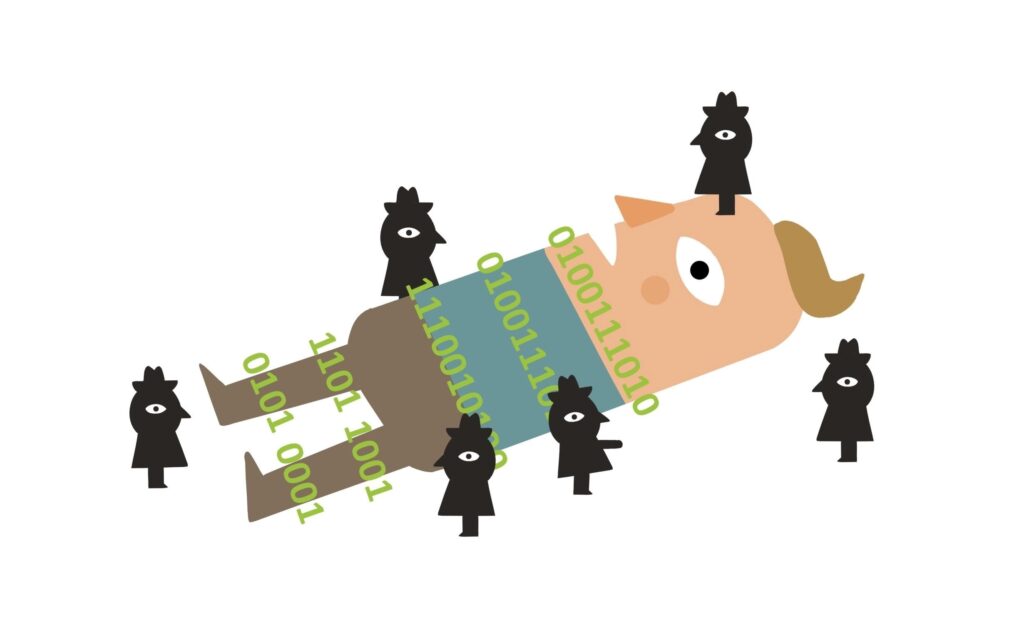'Big Brother law' dangerous recipe for series of new benefits scandals
SyRI coalition: Senate to reject Collaborative Data Processing Act
Citizens and entrepreneurs are defenceless against a new Big Brother law being debated in the Senate today. The new law gives governments, agencies and private organisations, such as banks and brokers, the right to share data with each other. Even if it only concerns suspicions. This may involve residential and financial data, but even sexual orientation. Not only of those involved, but also of people close to them.

Recipe for new allowance affair
It concerns the so-called Data Processing Collaboration Act (WGS). Ever since the benefits affair, it has been apparent that data in one agency's computer using this method can lead to punishments via another organisation. Together with authors Maxim Februari and Tommy Wieringa, a broad group of civil society organisations is therefore calling on the Senate to reject the WGS. Earlier, the same coalition fought(1) successfully adopted the fraud system SyRI.
Dangerous and uncontrollable
"This law enables practices that are dangerous and uncontrollable for citizens" says Tijmen Wisman, president of the Civil Rights Platform. "Citizens and entrepreneurs end up on blacklists - without court intervention and often through no fault of their own - and end up in major personal and financial problems as a result. They become known to agencies and companies as criminals or fraudsters, without being able to defend themselves against it. We have already seen with the Allowances affair what Kafkaesque situations this can lead to." In a letter to the Senate, the organisations write that such measures "in practice have the effect of a covert criminal conviction".
Behind-the-scenes punishment
The agencies sharing data can together coordinate very drastic measures, such as blocking bank accounts, revoking or refusing licences and receiving additional inspections and checks, claims and assessments. Information shared by a bank can lead to a measure at the municipality or the tax authority behind the scenes, without informing you. "Then the question is not whether it will go wrong again but mainly 'when' you will again dupe people and destroy them as a government," says FNV vice-president Kitty Jong. "We should have learned this lesson by now."
Adverse effect
Although Justice Minister Yesilgöz said the law should tackle undermining crime, according to the civil society coalition, it mainly undermines the functioning of the rule of law and trust in the government. Alarmingly, the minister brushed aside demands by the Personal Data Authority on judicial review as unnecessary. The coalition writes to the Senate on this: "Citizens and entrepreneurs targeted by collaborative partnerships face intangible problems that are impossible to challenge or reverse because of the secret working method. They get a 'tick' that haunts them everywhere and makes their work or daily life impossible."
How the WGS works
Under the WGS, governments and companies share all kinds of information about citizens and entrepreneurs. The information ranges from factual data to suspicions, risk signals and blacklists. Large amounts of data on groups of citizens, companies and areas can also be analysed to determine which citizens or entrepreneurs pose a 'risk'. Citizens or businesses are not informed of this; access can easily be refused. Challenging decisions thus becomes virtually impossible.
Download HERE The letter the civil society coalition against SyRI wrote to the Senate.
(1) The SyRI coalition consists of the Civil Rights Platform, FNV, Privacy First, the Dutch Lawyers Committee for Human Rights (NJCM), the National Clients Council, KDVP Foundation and writers Tommy Wieringa and Maxim February
This article previously appeared on 'Big-Brother Act dangerous recipe for series of new benefits scandals' - In Advance Suspicion and 'Big brother law' dangerous recipe for series of new benefits scandals' - FNV.
